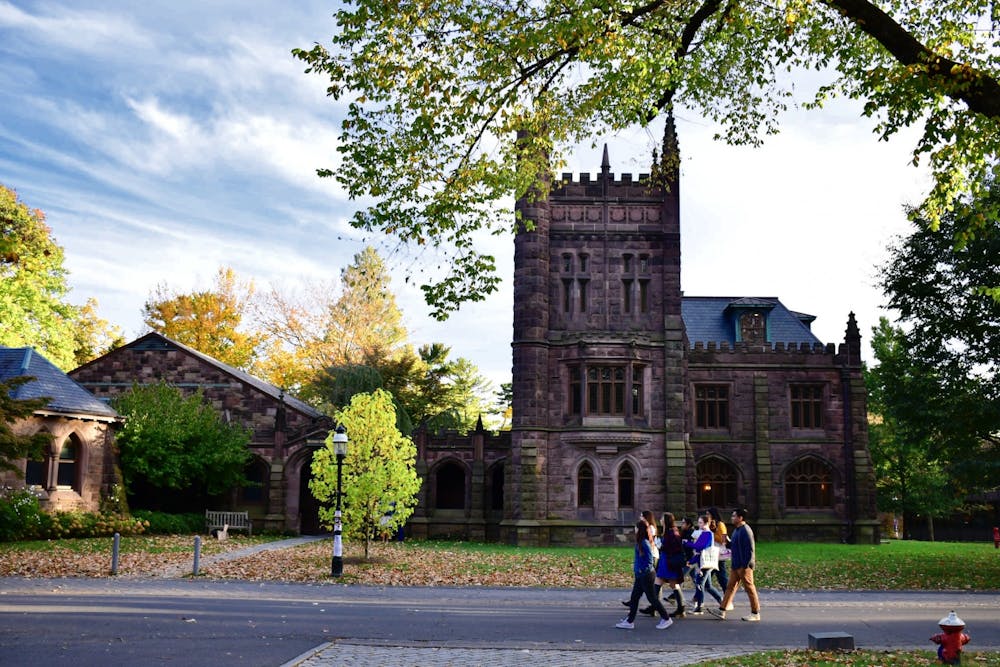Spontaneous interactions are rare during the COVID-19 era. Our conversations, except for those that occur with the people we live with, are decidedly deliberate. College publications ranging from The Harvard Gazette to The Daily Princetonian have highlighted college students’ loss of impromptu conversations and casual community during the pandemic.
The loss of one particular type of on-campus exchanges, however, deserves special attention: interfaith interactions.
Although Princeton is a secular institution, and many Princeton students do not identify as people of faith, the University’s campus is conducive to interfaith interactions. Princeton students come from a wide variety of faiths, including Sikhism, Buddhism, Christianity, and Islam, among many others. Official data about Princeton students’ religious affiliations is not readily available, but the recent frosh survey from the ‘Prince’ provides a glimpse into the Class of 2024’s religious composition. Of the 713 first-years who disclosed their religious affiliation on the survey, 38.3 percent identified as Christian, 8 percent as Jewish, and 4.9 percent as Hindu. For comparison, in the United States at large, 70.6 percent of individuals identify as Christian and 5.9 percent as holding a non-Christian faith. For students hailing from religiously homogeneous communities, their first meaningful interfaith interactions may well occur at Princeton.
Unfortunately, informal interfaith settings are difficult to recreate online. Take the Center for Jewish Life’s Shabbat dinners, which Princeton’s Jewish Chaplain, Rabbi Julie Roth, called “one of the high points of the week at the Center for Jewish Life.” According to Rabbi Roth, last academic year, from September to March, one thousand students attended a Shabbat dinner. Approximately five hundred of Princeton’s undergraduates are Jewish. These dinners, which were fruitful sites of interfaith dialogue, have been suspended during the pandemic, as have many other interfaith events. As Rabbi Roth noted, “we can’t really replicate that Shabbat dinner experience online.” She further explained that “the Princeton-affiliated chaplains still meet on a monthly basis, but we haven’t had as much interfaith programming in this Zoom environment.”
I am not a religious person, and I do not identify with a community of faith. As a person whose childhood was devoid of conversations about faith, interfaith dialogue seemed inconsequential to me. That changed when I began high school, where I was lucky enough to have a teacher who deeply cared about fostering interfaith understanding. He organized a variety of interfaith events, such as trips to a local mosque facilitated by Muslim students. I saw first-hand how these trips combated conscious and unconscious Islamophobia, which is prevalent in my Bible Belt home state of Arkansas. During these events, I learned that interfaith dialogue is relevant even to those of us who are not religious or those of us who feel we already have a thorough understanding of various religious traditions. These moments of connection enrich our understanding of different faith groups and force us to acknowledge and question our subconscious biases.
As Rabbi Roth beautifully explained to me, “Whether you are looking at people who are diverse within your own faith community, … or you are looking across faith backgrounds, or cultural backgrounds, or even just regional backgrounds in the United States, I feel like whenever you enter into conversation with somebody who has a different perspective, you clarify your own perspective, and you understand your own beliefs better. I think you also find commonalities that you might not realize that you had.”
More broadly, the understanding fostered by interfaith dialogue could facilitate conflict mediation. While the world’s attention is turned toward COVID-19, religious cleavages have not disappeared. From rising tensions in France to the continued plight of the Rohingya, or from the recent conflict in Nagorno-Karabakh to the ongoing Yemen crisis, interfaith and intrafaith conflicts remain a reality during the pandemic. Interfaith dialogue is uniquely poised to address conflicts in which faith plays a role and to build interfaith and intercultural understanding.
Matt Weiner, associate dean in the Office of Religious Life, explained to me that “religion, planetary-wide, is something that does a lot of good and a lot of bad. It motivates a lot of action and mindsets. That tends to not get talked about a lot in the public sphere because the public sphere is understood as secular. That means that we are having conversations about things that are really important without talking about what is really important to us.” Thus, interfaith dialogue could bring new meaning to unexpected spaces.

Although the opportunities for interfaith interactions afforded by Princeton’s campus are impossible to recreate, I urge us all to make room for interfaith dialogue in our lives. The University’s Religious Life Council, which engages in and promotes interfaith discussion, continues to meet regularly and is an excellent resource for students seeking interfaith interaction. As Weiner thoughtfully pointed out, “Although interfaith dialogue is affected by the world of Zoom, there are hidden gifts that include a movement toward one-on-one conversations and the value of solitude.” This historical moment gives us a unique opportunity to reflect on what interfaith dialogue means to us, which in turn will shape our relationship with interfaith connections going forward.
Genrietta Churbanova is a first-year from Little Rock, Ark. She can be reached at geaac@princeton.edu.









